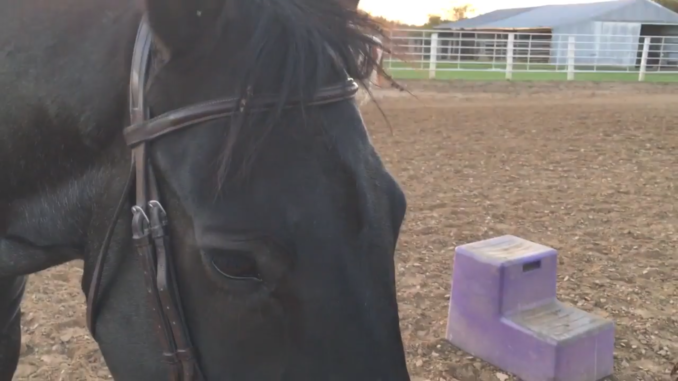
The Truman State University Equestrian Team is more than just a group of competitive horseback riders. Open to riders of all skill levels, both showing and non-showing members can find friendship, stress relief, a place to improve their skills.
The team’s requirements are loose and laid back so that members are able to get as much or as little out of their experiences.
Or as Riley Merdinain, the team’s president, puts it, “it really is about what you make it.”
Hannah Patton, the team’s vice president, says the experience allows members to make friends, learn about the importance of team bonding and find out who they truly are.
“Being on the team and coming out to practice is a big stress reliever so I can escape school for a little bit and be around horses,” says Patton. “Horses have been a big comfort to me. It’s just a place to escape and they are amazing animals.”
Truman’s equestrian team is part of the Intercollegiate Horse Association, which celebrates its 50-year anniversary in spring 2018. The team is made up of about 70 riders of all skill levels and operates as both a collegiate and competitive team, along with being a club for general interest riders.
Patton says she enjoys the traveling aspect, as the team competes around the Midwest in six shows each semester. But she explains not every member are able to participate, because most schools don’t have enough heroes to accommodate so many people.
Coach Emily Costello currently leads the team and has been with the team for the past 15 years. She says she works with the students on more than just horseback riding.
“Watching the kids care about and care for the horses and that it is a partnership,” says Costello. “They are trying to form a bond with these animals—they’re not just a piece of equipment—they’re living and breathing and they have good days and bad days just like us.”
Truman’s equestrian team has riders of both English/Hunter-Jumper and Western/Stock disciplines. The main difference between the two are the saddles and show events.
English riders compete in events such as dressage, which means displaying a series of movements to show how well a rider can instruct and train a horse. Another event is jumping, where courage and ability are tested on a course filled with fences. Western events include reigning (similar to dressage), barrel racing and competitive trail classes where the horse and rider must negotiate obstacles as if they were on a trail. When the team travels, they are not required to bring their own horses because the hosting university provides them.
Being assigned a new horse on the day of the competition isn’t always ideal, explains Riley Merdinain, the team president.
“You don’t know what horse you’re riding until you draw their name with a two or three sentence description,” says Merdinain. “That concept is so different because most people show their own horses. So it’s definitely a learning curve to get on and adapt to that horse so quickly and to do it well.”
The team practices Monday through Friday every week and begins with each member choosing from a list of available horses—a system that allows the members to ride a variety of horses instead of becoming too comfortable with any one horse.
But two weeks before a show, practices are closed. That’s because only those riders who will be participating in an upcoming show continue to practice. This allows each individual rider to focus on what he or she needs to improve on, including posture, jumping and steering through a predetermined course.
Throughout practices, all members are responsible for taking care of their horses, including tacking up, which means putting on saddles, halters, reins, bits and other equipment. They also must hose down their horses after each practice. The University Farm provides all the tack and other materials needed to perform these tasks.
Truman’s team welcomes both casual and competitive riders to join the team. But beginning riders typically spend more time learning the fundamentals of riding as well as grooming and tacking.
Both showing and non-showing members work on riding posture and training their horses.
“I try to come out to practice as much as I can, as much as any athlete would leading up to a competition,” says Patton. “I just love it all. Horses have been a big comfort to me and they’re just amazing animals. And I’ve really grown to love to compete as well.”
